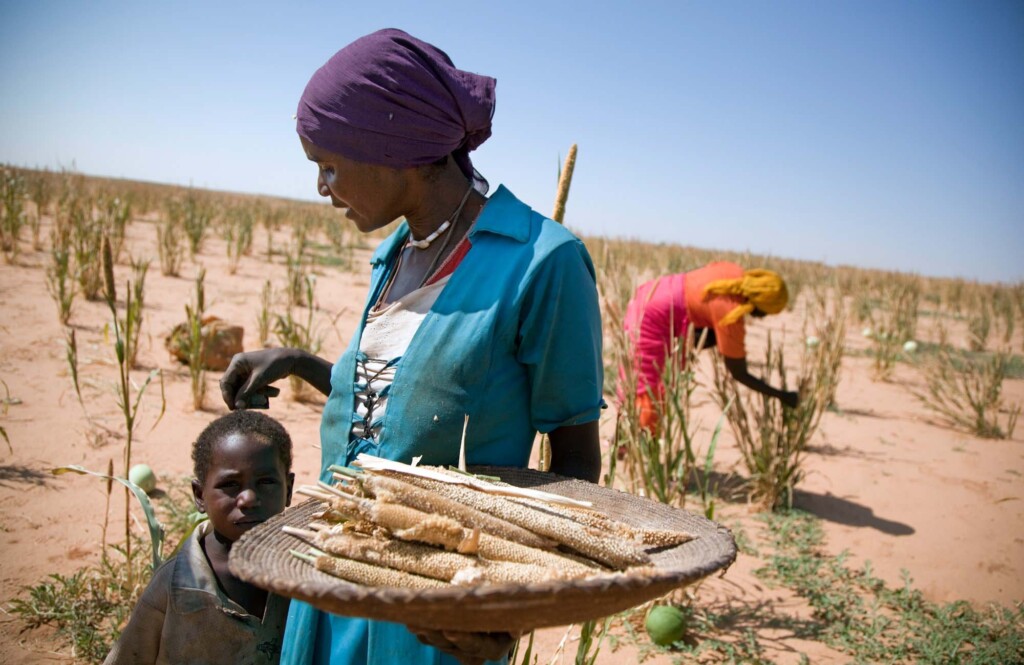UN Security Council assesses ‘deteriorating’ situation in North Darfur
A delegation of the UN Security Council Committee of Experts arrived in the capital of North Darfur, El Fasher, on Monday afternoon, meanwhile, people in the Darfur region complain of highway robberies, the destruction of crops by herders, deterioration of health services, and sexual harassment.
 Farmer harvests millet near El Fasher in North Darfur (File photo: Albert Gonzalez Farran / UNAMID)
Farmer harvests millet near El Fasher in North Darfur (File photo: Albert Gonzalez Farran / UNAMID)
A delegation of the UN Security Council Committee of Experts arrived in the capital of North Darfur, El Fasher, on Monday afternoon, meanwhile, people in the Darfur region complain of highway robberies, the destruction of crops by herders, deterioration of health services, and sexual violence.
On a visit of several days, the UN delegation will assess the situation in North Darfur and follow up on the work of the Civilian Protection Mechanism in the region.
The delegation is headed by Laura Bernal, Coordinator and Armed Groups Expert at the UN Security Council for Sudan, which was established by Resolution 1591 in 2005 to monitor the arms embargo, the implementation of the Juba Peace Agreement, the regional situation, and ongoing violence in Darfur. The mandate also placed a travel ban and asset freeze on those “impeding the peace process” in Darfur.
In a press statement following a meeting held at the state government headquarters in El Fasher on Monday, the governor of North Darfur, Gen Nimr Abdelrahman, said that they discussed the challenges of transitional justice, lack of impunity in the region, security conditions with neighbouring countries, in addition to the challenges of the agricultural season and the collection of weapons.
On Sunday, Ibrahim Adam was robbed while he was returning from his farm in Saraf Omra, North Darfur. Sources from the area told Radio Dabanga that two gunmen riding a motorbike intercepted the farmer at gunpoint and robbed his mobile telephone and money.
An engineer was robbed of his belongings and the company car he was riding in on the same day, in another area in Saraf Omra.
Destruction of crops
The area of Um Hosh in El Taweisha, North Darfur, witnessed a cautious calm on Tuesday following two days of “violent tribal fighting.” Listeners from Um Hosh told Radio Dabanga that the clashes erupted after herders moved their livestock onto farms and destroyed crops. An unknown number of people were killed and injured. The sources referred to efforts to sign a cessation of hostilities and to compensate those affected by the destruction of farms.
People living in the camps for the displaced in North Darfur also witnessed the destruction of a large number of crops by herds of cattle over the past two weeks. Community leader El Sheikh Ishag, head of the Darfur displaced camps, told Radio Dabanga that large agricultural areas near Tabit and Shangil Tobaya in North Darfur have been destroyed as livestock was moved onto farms without the consent of farmers. He said the security situation is deteriorating.
Reconciliation committee
Ishag pointed out that a reconciliation committee was formed to meet the governor of North Darfur, but no protection was provided for the farms. He explained that the displaced in the camps have not received any food aid due to a lack of funding, so they are solely dependent on the harvests for food. The community leader said that displaced farmers in South Darfur are dealing with the same problems.
In the past, there used to be clearly marked pasture tracks and traditional tribal procedures for the compensation of lost crops, but this changed during the regime of Omar Al Bashir. The regime supported the ‘Arab' herding tribes in the region, whilst looking down on non-Arab ‘African' farmers.
Arab tribesmen were recruited by the previous regime of dictator Omar Al Bashir to join the Janjaweed militias. Al Bashir employed these Arab militias to repress a revolt over ethnic marginalisation in the region, mainly targeting non-Arab African farmers in what became known as the Darfur Genocide. Many of these farmers still live in camps for the displaced.
Rapes
People living in El Neem camp for the displaced in El Daein, East Darfur, told Radio Dabanga that health services have deteriorated further and medicine is scarce. There are high rates of malnutrition among pregnant women and children in the camp, and young women and girls who leave the camp to go to work are regularly harassed and raped.
Midwife and nurse Egsam Fadeel told Radio Dabanga on Tuesday that the health centre receives at least six women each month who became pregnant as a result of rape. She also said that the camp environment is deteriorating as medical waste is being burnt inside the camp.
On September 5, a newly formed committee of the Darfur Regional Government (DRG) signed an agreement with the protest leaders of a 17-day-long sit-in at Zamzam camp near El Fasher. The agreement “responds to most of our demands for security, justice, and development,” said members of the sit-in, and explained that the committee pledged to deploy sufficient forces to protect the camp and the agricultural season, and to upgrade the police post in the camp to a police station.











 and then
and then